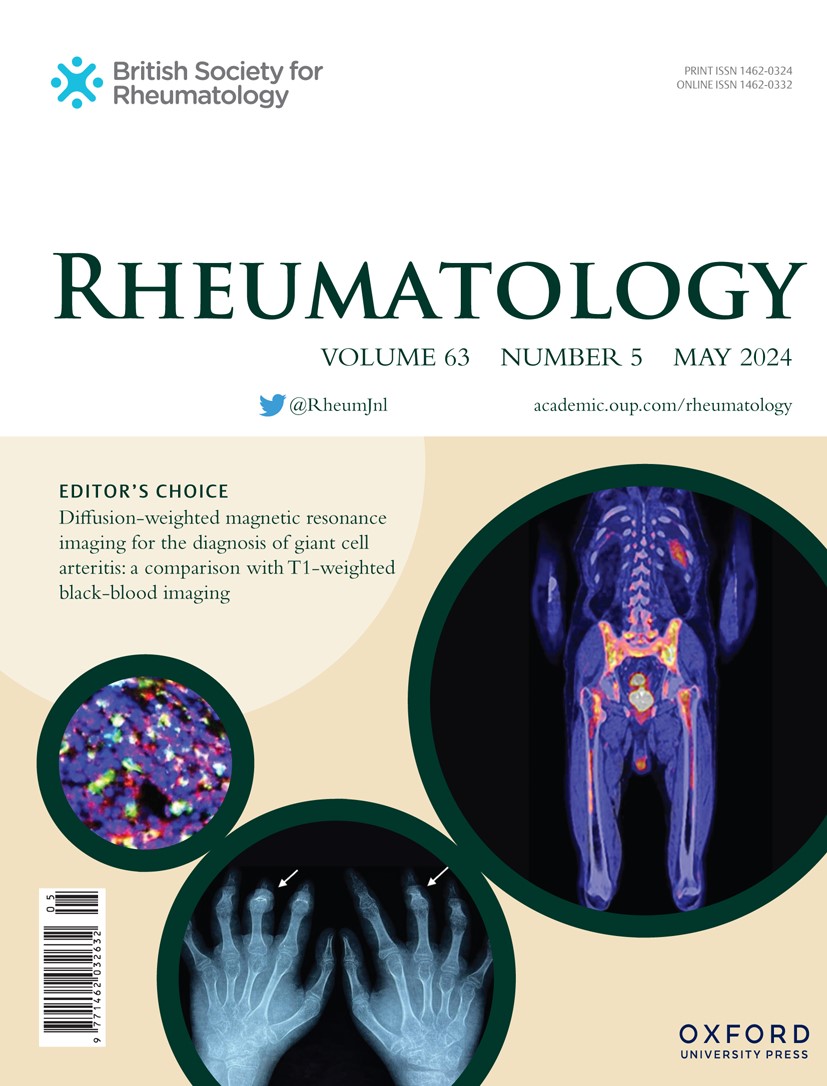双歧杆菌改善狼疮性肾炎和调节淋巴细胞亚群的异常分化
IF 4.7
2区 医学
Q1 RHEUMATOLOGY
引用次数: 0
摘要
肠道菌群在狼疮性肾炎(LN)的进展中起着至关重要的作用,益生菌已成为一种潜在的治疗方法。本研究探讨双歧杆菌在LN发病机制中的作用及其对免疫细胞群的影响。方法收集61例系统性红斑狼疮(SLE)患者的临床标本,采用流式细胞术分析患者CD4+ T和B细胞亚群的变化。ELISA定量测定人和小鼠模型的细胞因子分泌和自身抗体。此外,16S rRNA测序鉴定了患者肠道微生物群丰度的变化,并有助于筛选潜在的益生菌。组织病理学检查和免疫荧光染色评估双歧杆菌、其总代谢物和短链脂肪酸(SCFAs)对MRL/lpr小鼠肾损伤的改善。结果SLE患者肠道菌群丰度和多样性下降,特别是双歧杆菌减少。临床数据显示,LN患者的记忆B细胞、中枢记忆T细胞、Treg细胞和IL-2的比例较低,而效应记忆T细胞、Th1和Th17细胞、IL-10和IFN-γ的比例较高。补充双歧杆菌及其代谢物和SCFAs纠正了CD4+ T和B细胞亚群和细胞因子水平的失衡,降低了小鼠的自身抗体水平,并减轻了肾脏损伤。结论双歧杆菌在SLE患者中明显减少,影响LN患者的肾损伤和免疫细胞平衡。此外,在MRL/lpr小鼠中补充双歧杆菌及其总代谢物和SCFAs可显著改善MRL/lpr小鼠的肾损伤,恢复免疫细胞平衡。本文章由计算机程序翻译,如有差异,请以英文原文为准。
Bifidobacterium ameliorates lupus nephritis and modulates aberrant differentiation of lymphocyte subsets
Objectives The gut microbiota is crucial in the progression of lupus nephritis (LN), and probiotics have emerged as a potential therapeutic approach. This study investigates the role of Bifidobacterium in LN pathogenesis and its effects on immune cell populations. Methods Clinical samples were collected from 61 systemic lupus erythematosus (SLE) patients, and flow cytometry was used to analyze changes in CD4+ T and B cell subsets. ELISA quantified cytokine secretion and autoantibodies in both human and murine models. Additionally, 16S rRNA sequencing identified variations in gut microbiota abundance among patients and helped screen for potential probiotics. Histopathological examination and immunofluorescence staining assessed kidney injury improvements in MRL/lpr mice treated with Bifidobacterium, its total metabolites, and short-chain fatty acids (SCFAs). Results SLE patients showed decreased gut microbiota abundance and diversity, particularly a reduction in Bifidobacterium. Clinical data revealed lower proportions of memory B cells, central memory T cells, Treg cells, and IL-2, alongside increased effector memory T cells, Th1 and Th17 cells, IL-10, and IFN-γ in LN patients. Supplementation with Bifidobacterium, its metabolites, and SCFAs corrected the imbalances in CD4+ T and B cell subsets and cytokine levels, reduced autoantibody levels in mice, and alleviated kidney damage. Conclusions Bifidobacterium is significantly diminished in SLE patients, influencing kidney injury and immune cell balance in LN. Moreover, Bifidobacterium, its total metabolites and SCFAs’ supplementation in MRL/lpr mice notably improved kidney damage and restored immune cell equilibrium in MRL/lpr mice.
求助全文
通过发布文献求助,成功后即可免费获取论文全文。
去求助
来源期刊

Rheumatology
医学-风湿病学
CiteScore
9.40
自引率
7.30%
发文量
1091
审稿时长
2 months
期刊介绍:
Rheumatology strives to support research and discovery by publishing the highest quality original scientific papers with a focus on basic, clinical and translational research. The journal’s subject areas cover a wide range of paediatric and adult rheumatological conditions from an international perspective. It is an official journal of the British Society for Rheumatology, published by Oxford University Press.
Rheumatology publishes original articles, reviews, editorials, guidelines, concise reports, meta-analyses, original case reports, clinical vignettes, letters and matters arising from published material. The journal takes pride in serving the global rheumatology community, with a focus on high societal impact in the form of podcasts, videos and extended social media presence, and utilizing metrics such as Altmetric. Keep up to date by following the journal on Twitter @RheumJnl.
 求助内容:
求助内容: 应助结果提醒方式:
应助结果提醒方式:


